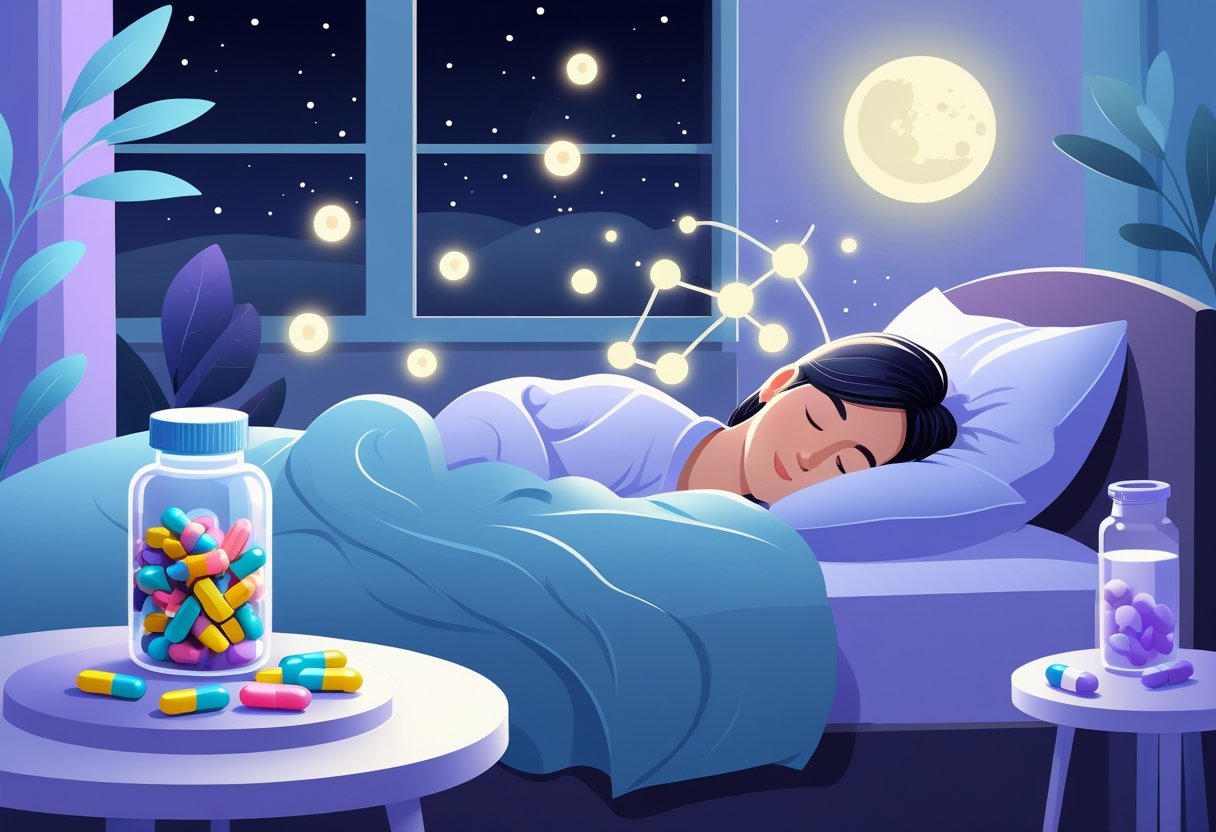Amino acids have an important role in helping the body relax and sleep better. Certain types like glycine, GABA, and tryptophan help calm the nervous system, which can lead to longer and more peaceful rest. These can be added through supplements or found in foods, giving the body extra support before bedtime. They work by supporting brain and body functions linked to sleep. Glycine, for example, can lower body temperature and boost serotonin levels, both connected to deeper sleep. While more studies are still needed, early findings suggest amino acids may offer a natural way to ease sleeplessness without turning to strong medications.
Knowing how these amino acids work and using them correctly can help people who struggle to sleep. When combined with good habits like a steady bedtime routine, they can support better rest and help people wake up feeling refreshed.
Key Takeaways
- Amino acids help calm the nervous system to support better sleep.
- Some types influence brain chemicals that control sleep patterns.
- Proper use with healthy habits may lead to improved sleep quality.
- A supportive mattress helps the body relax physically, while amino acids calm it from within, working together to create deeper and more restful sleep.

How Amino Acids Influence Sleep

Amino acids affect sleep in different ways. They help keep the nervous system balanced and support chemicals in the brain that control rest. These small compounds guide how the body manages sleep quality and timing by working closely with the brain and central nervous system.
Amino Acids and Sleep Regulation
Some amino acids directly control how the body falls and stays asleep. Tryptophan plays a big role because it helps the body create serotonin and melatonin. These two hormones tell the body when it’s time to sleep and when to wake up. When tryptophan levels are steady, it’s easier to relax, fall asleep, and stay asleep through the night.
Branched-chain amino acids (BCAAs), leucine, isoleucine, and valine, interact differently. They can compete with tryptophan when entering the brain. When this happens, falling asleep might take longer, and sleep may not last as long. The right balance of these amino acids supports a more stable sleep rhythm, especially in growing children.
Roles in Sleep-Wake Cycle
Amino acids help manage the sleep-wake cycle by guiding how the nervous system sends signals. When tryptophan turns into serotonin, it supports melatonin production, which tells the body when to rest.
Other amino acids, like glycine, help cool the body’s core temperature, which is a natural step before sleep. GABA (gamma-aminobutyric acid), which comes from amino acids, quiets brain activity so the mind can settle down. When amino acid levels are out of balance, the body’s circadian rhythm can shift, leading to shorter or delayed sleep and daytime tiredness.
Amino Acids as Neurotransmitter Precursors
Many amino acids act as the foundation for neurotransmitters that shape how we sleep. Tryptophan turns into serotonin, which is key for mood and rest. Glutamate and GABA are also made from amino acids. Glutamate excites brain cells, while GABA calms them down, creating a healthy balance between being awake and sleeping.
By supporting these brain chemicals, amino acids guide how long it takes to fall asleep, how deep the rest is, and how refreshed the body feels in the morning. Their job goes beyond basic nutrition. They work at the chemical level to support healthy sleep. For more information, research on branched-chain amino acids and overviews of amino acids for sleep.
Key Amino Acids for Better Sleep
Certain amino acids have well-studied roles in improving sleep by affecting relaxation, sleep onset, and the quality of deep sleep. These compounds interact with brain chemicals like serotonin and melatonin, which guide the body’s sleep cycle. They help calm the mind and support steady sleep patterns, allowing for a deeper and more refreshing rest.
Glycine’s Sleep-Enhancing Effects
Glycine helps the body prepare for sleep by gently lowering core temperature. This cooling effect tells the body it’s time to rest. Research shows that taking glycine before bed can shorten the time it takes to fall asleep and support deeper, more consistent sleep. It also helps keep the sleep cycle steady, allowing the body to move smoothly between light and deep sleep. This leads to better recovery and sharper alertness in the morning. Glycine can be found in bone broth, m
Tryptophan, Serotonin, and Melatonin
Tryptophan is an essential amino acid that the body uses to create serotonin and melatonin. Serotonin helps with relaxation and mood, while melatonin signals the body that it’s time to sleep. When there’s enough tryptophan, the body can make more of these hormones, helping maintain a regular sleep rhythm. Some people use 5-HTP supplements, which come from tryptophan, to support serotonin levels. Foods like turkey, eggs, and nuts naturally contain tryptophan.
GABA and Relaxation
Gamma-aminobutyric acid (GABA) is a neurotransmitter that helps quiet brain activity. It eases tension by calming nerve signals, which can make it easier to fall asleep. High GABA levels support a smoother transition to sleep and help keep it steady through the night. GABA supplements are known for promoting calm without the grogginess that some sleep medications bring. When combined with other relaxing amino acids, GABA helps support the body’s natural sleep rhythm.
L-Theanine and Sleep Quality
L-Theanine, found in green tea, supports relaxation by increasing levels of GABA and dopamine in the brain. This creates a calm mental state, easing stress and helping the mind settle before bed. It doesn’t cause drowsiness, but it can help improve sleep by reducing nighttime awakenings. Many people find it useful when they have a busy or anxious mind at night. L-Theanine works well with other amino acids to support more restful and steady sleep. For more details, see Top 5 Amino Acids for Better Sleep.

Mechanisms Behind Amino Acid Sleep Support
Amino acids affect sleep by influencing brain chemicals, body clocks, and core body temperature.
They help the brain produce key neurotransmitters, guide the body’s sleep rhythm, and control temperature changes that signal it’s time to rest. These small compounds quietly support how the body prepares for sleep each night.
Neurotransmitter Production and Balance
Amino acids like tryptophan help the body create serotonin, a chemical that supports calmness and better sleep. When serotonin levels are steady, it’s easier to relax and fall asleep without feeling restless. GABA is another key chemical that helps the brain slow down at night. Some amino acids, such as glycine, support this process by improving communication between nerve cells. When the brain quiets down, it’s easier to drift off naturally.
A steady supply of amino acids can support better sleep without the side effects that usually come with sleeping pills. It helps the body manage its own sleep signals in a natural way.
Regulation of Circadian Rhythm
The circadian rhythm works like the body’s internal clock, guiding when to sleep and wake up. Amino acids such as l-serine and l-ornithine can support this clock by helping regulate the hormones that control alertness and rest. Studies show that some amino acids influence genes that set the body’s daily rhythm. When these signals are in sync, the body knows when it’s time to wind down. This keeps the sleep schedule steady, even when routines change.
Amino acids also send signals to organs outside the brain, helping the entire body stay aligned with light and meal patterns. This keeps everything running on time.
Influence on Body Temperature
The body cools down naturally before bedtime. This drop in temperature tells the brain that it’s time to sleep. Amino acids play a role in supporting this change through their effect on metabolism and the nervous system. Glycine can help lower core body temperature slightly, which encourages faster relaxation and sleep. A cooler body makes it easier to get comfortable and drift off.
When amino acids help regulate these small shifts, the body prepares more smoothly for rest. This leads to deeper, steadier sleep through the night.

Amino Acid Supplementation and Safety
Amino acid supplements can support better rest, but they work best when used carefully. How much you take and when you take it matters. Paying attention to possible side effects and how they mix with other sleep aids or medications also helps keep things safe. A clear plan can lead to more consistent sleep results.
Dosage Considerations
The right dose depends on the type of amino acid. Many people take around 3 grams of glycine about 30 to 60 minutes before bed. Tryptophan is usually between 250 mg and 1,000 mg, and pairing it with a small amount of carbs can help your body absorb it better. GABA doesn’t have a fixed standard, but many start between 100 mg and 500 mg.
It’s better to begin with the smallest amount that works and see how your body reacts. If needed, you can slowly adjust the dose. Always follow what’s on the label or your doctor’s advice. Most of these supplements come as powders or capsules, so it’s easy to manage. Taking them at the same time each night supports your sleep rhythm. Going beyond the suggested amount can raise the chance of side effects.
Potential Side Effects
Most amino acid supplements are easy to tolerate when taken correctly. Some people may feel sleepy, a bit nauseated, or have an upset stomach. This usually happens when the dose is too high or when combined with other calming products.
GABA can trigger dizziness or mild headaches in some users. Glycine rarely causes tiredness the next day, but if anything feels off, it’s smart to adjust or pause the dose. A few people may also have intense dreams or disrupted sleep if their brain chemistry reacts strongly. Those with liver or kidney concerns should talk to a doctor before use.
Interactions with Other Sleep Aids
These supplements can react with other sleep products or medications. GABA with magnesium or valerian root can make you sleepier but may also increase drowsiness the next day.
People taking antidepressants, SSRIs, or sedatives should speak to a healthcare professional before trying amino acid supplements. Tryptophan affects serotonin levels, which can be risky if mixed with serotonin-related medications. It’s best not to mix different sleep aids without professional advice. Doing so can cause side effects or unwanted reactions. Paying attention to how your body responds when starting or changing a supplement is key to staying safe.

Natural Sources and Diet for Sleep Health

Certain amino acids help the body produce melatonin and serotonin, which are key for sleep. These nutrients usually come from protein-rich foods like dairy, meat, and fish. Eating a balanced mix of these sources also supports gut and immune health, which can lead to better sleep.
Protein-Rich Foods for Amino Acids
Protein-rich foods give the body the amino acids it needs to regulate sleep. Nuts, seeds, legumes, and whole grains contain tryptophan, glycine, and other nutrients that support relaxation. Pumpkin seeds and soybeans have plenty of tryptophan, which the body turns into melatonin. Plant-based proteins also help keep the gut healthy, which supports digestion and nutrient absorption. Beans and lentils contain glycine, which can help calm the nervous system. Oats are another good option because they have both magnesium and tryptophan, which help the body relax before sleep.
Eating different types of protein throughout the day helps maintain a steady level of amino acids. This supports better sleep naturally, without depending on supplements.
Dairy, Meat, and Fish
Animal-based foods are strong natural sources of sleep-supporting amino acids. Dairy products like milk, cheese, and eggs contain tryptophan and melatonin, which help regulate sleep. Milk collected at night has even higher melatonin levels, which may make it more effective. Turkey and chicken are good sources of tryptophan too. Pairing these proteins with carbs can help the body absorb them more easily and support melatonin production.
Fatty fish like salmon also provide omega-3s and vitamin D. These nutrients support serotonin production, which affects mood and sleep. Eating more fish may be especially helpful when there’s less sunlight exposure.
Optimizing Diet for Better Sleep
Combining protein-rich foods with complex carbohydrates can support a more restful sleep. Carbs help the body use amino acids more effectively, which boosts sleep hormone production. Magnesium-rich foods like spinach, bananas, and pumpkin seeds also support relaxation. Eating these with proteins can help ease the body into rest.
Avoiding sugary, fatty, or processed foods before bed is important, since they can disrupt sleep patterns. A balanced diet with different sources of amino acids supports gut health, immune function, and more restful nights.
Lifestyle Strategies for Maximizing Amino Acid Benefits

Maximizing the effects of amino acids for sleep isn’t just about taking supplements. It also depends on having steady sleep habits, lowering stress, and creating a calm environment before bed. These steps help the body use amino acids more efficiently, which supports better rest, energy, and mood.
Building a Supportive Sleep Routine
A regular sleep schedule helps keep the body’s natural rhythm steady. Going to bed and waking up at the same time every day can improve sleep quality and lessen tiredness. When the brain knows it’s time to rest, amino acids like GABA and glycine can work better to help the body relax. A calm bedtime routine can also boost these effects. Simple steps like dimming lights, staying away from screens, and turning off noisy devices about an hour before bed help the mind slow down. This kind of setup allows for deeper, more peaceful sleep with fewer interruptions during the night.
Stress Reduction and Healthy Habits
High stress can get in the way of how amino acids support sleep. Relaxing activities like deep breathing, gentle yoga, or short meditations can lower cortisol levels and help calming compounds such as L-Theanine and tryptophan do their job. When stress levels go down, it’s easier to relax and drift into sleep.
Daily habits also affect how amino acids work. Skipping caffeine later in the day, eating balanced meals, and limiting alcohol can help the body process these compounds better. On the other hand, poor habits can lower their benefits and lead to sleep problems linked to anxiety or low mood.
Combining Amino Acids with Sleep Hygiene
A clean sleep environment helps amino acids support steady sleep patterns. This includes keeping the room cool and dark, using the bed only for rest, and avoiding big meals before sleeping. These steps give the nervous system a quiet space to relax. When amino acid supplements are used with these habits, it can be easier to fall asleep and stay asleep longer. For example, using glycine or GABA in a low-stimulation setting can help create more continuous sleep, fewer awakenings, and better rest through the night.
How Mattresses and Amino Acids Work Together for Better Sleep
Sleep closely affects how the body feels at night. When the mattress provides steady support, the spine stays in a natural position and pressure is eased in the right areas. This comfort helps the body relax, making it easier to fall asleep without feeling stiff or uneasy.
Amino acids like glycine, tryptophan, and GABA have an important role in sleep. They help calm the nervous system and signal the body that it’s time to rest. When the body already feels supported, these signals flow more smoothly, helping you stay asleep through the night instead of waking up tired or restless.
Combining a well-designed mattress with amino acids can build a steady sleep routine. The mattress takes care of physical comfort, while the amino acids work from the inside to guide the body into a restful state. This can help lower body temperature, ease pressure, and calm racing thoughts.
When both work side by side, sleep tends to be deeper and less interrupted. Choosing a mattress with strong support and cooling can make these effects stronger. A good example is the Amerisleep AS6 Mattress, which is built to feel soft and contouring while keeping the body aligned. It also has cooling layers, zoned coils, and firm edges to keep the surface stable. With this kind of setup, falling asleep feels easier and mornings can start with more energy.








